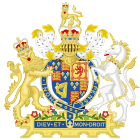Indemnity and Oblivion Act facts for kids
| Act of Parliament | |

|
|
| Long title | An Act of Free and Generall Pardon, Indemnity, and Oblivion. |
|---|---|
| Citation | 12 Cha. 2. c. 11 |
Quick facts for kids Dates |
|
| Royal assent | 29 August 1660 |
| Commencement | 25 April 1660 |
| Other legislation | |
| Repealed by | Statute Law Revision Act 1948 |
|
Status: Repealed
|
|
| Text of statute as originally enacted | |
The Indemnity and Oblivion Act of 1660 was an important law passed by the Parliament of England. Its full name was "An Act of Free and General Pardon, Indemnity, and Oblivion." This law was like a fresh start for many people in England. It offered a general pardon, or forgiveness, for most crimes committed during the English Civil War and the time after it, known as the Commonwealth period.
However, not everyone was forgiven. Certain serious crimes, like murder, piracy, and witchcraft, were still punished. Also, people who were directly involved in the execution of King Charles I were not pardoned. The Act also made sure that no one could be punished later for actions taken during the Interregnum (the time when England had no king). It was meant to help the country forget the past conflicts and move forward.
Contents
Why Was This Act Needed?
This special law was created to keep a promise made by King Charles II. Before he returned to England to become king, he issued the Declaration of Breda. In this declaration, he suggested that only those who had played a direct role in the execution of his father, King Charles I, would face punishment. Everyone else would be forgiven.
Lord Clarendon, who was King Charles II's main minister, helped get this Act passed through the Convention Parliament. It officially became law on August 29, 1660. This happened during the first year of the English Restoration, which was when the monarchy was brought back to England.
Forgiveness and Forgetting
The Act aimed to bring peace after many years of fighting and change. Lands that belonged to the Crown (the King) and the Church were given back automatically. However, lands taken from Royalists (supporters of the King) and others during the Civil War were not automatically returned. Those issues had to be sorted out privately.
Some Royalists felt disappointed. They joked that the Act meant "indemnity for [Charles'] enemies and oblivion for his friends." This meant that the King's enemies were forgiven, but his loyal supporters were forgotten when it came to getting their property back.
However, many historians praise King Charles II and Clarendon for this Act. They see it as a very generous and merciful act, especially for that time in history. Twenty years later, King Charles II even reminded people how many of them had benefited from his willingness to avoid more bloodshed.
Who Was Not Pardoned?
The Act is often remembered for those who were not pardoned and faced severe consequences. The debate in Parliament about who should be excluded from the pardon lasted for over two months. Names were constantly added and removed from the list.
Initially, only seven people were on the list of those not to be pardoned. These included Thomas Harrison and Thomas Scot. Later, more names were added, including John Cooke, who was the prosecutor in King Charles I's trial. Parliament decided that about twenty people, besides those who had judged the King, would face penalties that did not include death.
One famous person who did benefit from the Act was John Milton, a well-known writer. He had been imprisoned but was released thanks to this law.
Key Ideas of the Act
The Act had many sections, but its main goals were:
- To offer a general pardon for most crimes committed during the Civil War.
- To make sure that past actions of hostility between the King and Parliament were forgotten.
- To prevent people from using harsh words or insults that would bring back memories of the past conflicts.
- To ensure that certain serious crimes, like murder and piracy, were still punished.
- To make exceptions for those who had played a direct role in the King's execution.
Timeline of the Act
The process of passing this important law took several months:
- May 9, 1660: The idea for the Pardon and Oblivion Act was first introduced.
- May 12, 1660: The bill was read for the second time.
- May 17, 1660: The bill went to a special committee for review.
- July 11, 1660: The bill's title was officially set as "An Act of free and general Pardon, Indemnity, and Oblivion." It then passed and was sent to the House of Lords.
- August 7, 1660: The House of Lords was reminded about the bill.
- August 11, 1660: The bill came back from the House of Lords with some changes and additions. It went back to committee.
- August 28, 1660: Both houses of Parliament agreed on the final changes. The bill was sent to the Lords, and the King agreed to sign it the next day.
- August 29, 1660: The Act was officially passed into law by King Charles II.
This Act was eventually cancelled by the Statute Law Revision Act 1948 many years later.
Similar Acts
There was also a similar law passed for Ireland. An "Act of Free and General Pardon, Indemnity, and Oblivion [for Ireland]" was sent to the Duke of Ormonde in 1664.
 | Janet Taylor Pickett |
 | Synthia Saint James |
 | Howardena Pindell |
 | Faith Ringgold |

